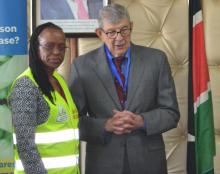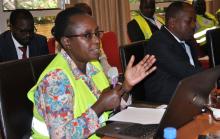Kenya’s chance for Guinea Worm FREE status
December 1, 2017
Kenya may be certified Guinea Worm free if the country meets the requirements set by the International Commission for the Certification of Dracunculiasis (Guinea Worm) Eradication (ICCDE).
A team of eminent local and international experts have arrived in the country and will for the next two weeks evaluate selected counties to establish the country’s status in regard to Guinea Worm disease. They are from several countries including USA, India, Burkina Faso, Nigeria, Uganda and Ghana.
The team is led by Dr Joel Breman, renowned professor of epidemiology and global health who is known for his role in eradicating smallpox and member of International Commission for Certification of Dracunculiasis Eradication,
The team will seek to establish the country’s status and readiness by evaluating awareness of the disease, evidence of a functional surveillance system that can detect any imported case, and a proof of absence of transmission for at least three years during the pre-certification phase.
Speaking in Nairobi at the launch of the team’s mission, Cabinet Secretary Dr Cleopa Mailu said the certification for Kenya had been long overdue and that the Ministry of Health and the country at large looked forward to the team completing the exercise successfully (hopefully in Kenya’s favour). He said Kenya had intensified and sustained high levels of disease surveillance and sensitization of communities and had interrupted the indigenous transmission of Guinea Worm disease in 1994. It had also contained imported cases in 2005.
He said the Ministry had since 2012 with the support of WHO intensified its surveillance and monitoring efforts through health information management tools and records. Also a major advocacy campaign which was launched in August 2015, with a cash reward of KShs.100,000/ to anyone who could find an indigenous Guinea Worm infestation within Kenya.
The meeting was attended by WHO Kenya representative Dr Rudi Eggers who said Kenya was one of the eight countries which had not been not certified to be GW free. WHO was committed to support the process to ensure the country was Guinea Worm free, he added.
“Should Kenya be declared Guinea Worm free after this evaluation, it would have been a historical and significant public health milestone, in the world, the second disease declared eradicated in Kenya after small pox”.
Dr Breman said the team would make recommendations for certification once they confirm (after the evaluation) that the country has met the certification criteria and that the findings confirm the information in the country report which shows Kenya has interrupted transmission and there are no cases reported in the last 3 years.
Reason for not certifying the county would be if the findings indicate gaps in “rumour investigation” or if there is inadequate surveillance.
“If we should find cases that show the disease has been active in the last three years, then we would recommend continued surveillance, containment of the disease and awareness creation for the next three years before we can attempt certification,” Dr Breman added.
He said the criteria for evaluation included areas where the last cases occurred (Trans Nzoia, West Pokot, Turkana), the border areas, especially those bordering South Sudan, refugee camps, any locations with poor surveillance or where notification of suspected cases (rumours) were made.
Seven countries in AFRO region remain to be certified including four endemic countries - South Sudan, Mali, Ethiopia and Chad. The two countries in pre-certification stage are Kenya and Sudan. Two have never reported cases, namely, Angola, and DRC.
Kenya remains uncertified since interrupting indigenous transmission in 1994, due continued threat of re-infection from neighbouring endemic South Sudan and Ethiopia and due to general population movement and refugee influx.
Dr Tatu Kamau, focal point for Guinea Worm at the Ministry of Health, said great effort had been made to sustain surveillance and to create awareness by her team and the National Guinea Worm Certification Committee.
She said after putting out a reward of Sh 100,000 many people were encouraged to establish cases similar to the disease. “We received a total of 186 rumour cases all of which were investigated and nullified”, she said.
Most of the cases came from former endemic locations, namely, Turkana, West Pokot and Trans Nzoia.
She said the team had found it difficult to make the case for Guinea Worm disease given it was an ‘abstract’ disease that most Kenyans did not know about or recognize. “It has been an uphill task trying to convince people to look and find a case because first of all there are other serious health conditions and secondly, people don’t know what that looks like.”







